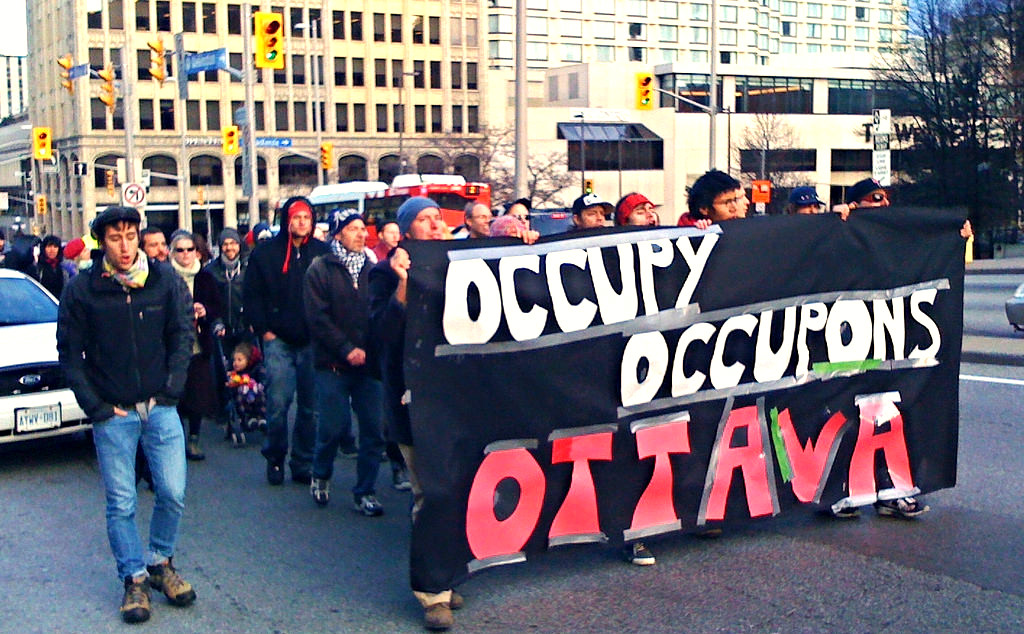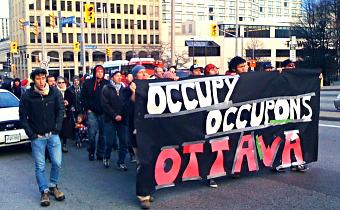US Election 2016: Sanders and Trump “Clearly Owe a debt” to Occupy and the Tea Party, Respectively
As they continue to tear up their respective parties, Bernie Sanders and Donald Trump are tapping into rich veins of “anti-establishment” fury. And while they’ve managed to create movements of a force not seen at the ballot box in years, they clearly owe a debt to the US’s two biggest protest movements of recent years: on the right, the Tea Party, and on the left, Occupy.
On the surface, it seems simple enough. Trump’s highly divisive campaign has amplified a nativist strain that already ran strongly through the Tea Party; various observers see Sanders as an advocate for the supposed “class warfare” associated with Occupy.
But this rests on assumptions about the Tea Party and Occupy that aren’t completely accurate. In fact, both were far more internally diverse than was recognised at their peak – and it’s that quality that actually best resonates with what’s happening in the 2016 election.
While the Tea Party’s ranks certainly included a radical conservative majority, it also consisted of various elements held together by libertarians tolerant of a range of differing opinions. These Tea Partiers were open-minded about immigration, social issues, gay rights, and other issues, and they duly met with some hostility from the Tea Party’s more bellicose conservatives. Nonetheless, because of their shared disdain for government power and devotion to individual liberty, these libertarians became fellow travellers.
Meanwhile, while Occupy’s strong progressive or liberal majority generally dominated the considerable press coverage the group’s protests attracted, there was also a dissenting minority – an agglomeration of the radical left, left-libertarians, and anarchists who had a fundamentally different vision for the future of the country. Their views on inequality and the erosion of community chimed with the Occupy mainstream, but their positions on hierarchy, governmental power, and tactics differed significantly and caused friction.
Even though the Tea Party and Occupy spoke for a minority of the American population, the feelings of intense grievance and umbrage they expressed have permeated mainstream politics. There is now substantial division and discord within both parties, many of whose core constituencies are unwilling to compromise.
Falling apart
On the right, the friction between hardline conservatives and more libertarian types appears to have opened up a deep divide within the Republican Party, one that might be irreparable.
The Tea Party experience initially emboldened libertarians in their efforts to wield national political influence, and their renewed zeal for politicking drove Ron Paul’s explicitly libertarian 2012 campaign to far greater success than his 2008 run. But the Republican nomination responded by changing the rules of the convention to silence Paul and the corresponding delegates supporting him.
After that, many libertarians swore an end to their participation in the Republican Party. And the failure of Rand Paul’s 2016 campaign indicates that whatever grip they had on the party’s thinking has slipped.
This libertarian collapse helps explain how candidates such as Donald Trump are frontrunners, even as they focus on social issues and authoritarian practices miles away from anything resembling a limited government philosophy.
The Democratic Party is witnessing a fragmentation as well, as Bernie Sanders lends a surprisingly strong voice to sections of American society that include the minority mentioned earlier in Occupy – even if he isn’t necessarily as hard a leftist as they might like.
Even Noam Chomsky, deeply sceptical of the possibility of a left-wing ascendancy in American politics, has sympathetic words for Sanders. It seems that after years on the margins, there’s a renewed desire among the radical left, the libertarian-left, and others to exert some real influence in mainstream electoral politics.
That the twin legacies of the Tea Party and Occupy have so disrupted the 2016 election spells deep change in American politics for years to come. The phenomenal performances of Sanders and Trump challenge the notion that American political culture is essentially bipolar, with coherent Republican and Democratic factions on either side, and indicate that the artificially bipolar makeup of American electoral politics need not necessarily be a given.
It would indeed seem that Americans are now following more in the steps of Thomas Jefferson, who stated: “I never submitted the whole system of my opinions to the creed of any party of men whatever, in religion, in philosophy, or in anything else, where I was capable of thinking for myself.”
Alfred Cardone, is a PhD candidate at the Institute of North American Studies, King’s College London.
This article was originally published on The Con
versation. Read the original article.
Read More..
Comments
There are 0 comments on this post













